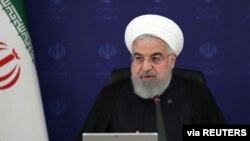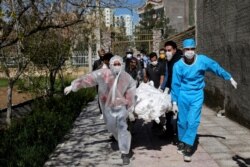Iran’s president said the country has extended furloughs for prisoners for another month as officials struggle to curtail the spread of the coronavirus.
Hassan Rouhani’s announcement on Sunday followed an earlier decision to allow so-called low-risk businesses — including many shops, factories, and workshops — to resume operations in Tehran.
Rouhani said mosques and other religious centers would remain closed for another two weeks and that decisions on gatherings during Ramadan will be decided later.
The Islamic holy month is scheduled to begin April 23.
Iran has reported more than 80,000 confirmed infections and more than 5,000 deaths. But many Iranians and other experts think the government has intentionally underreported the extent of the pandemic.
The Health Ministry has said the real infection and death toll may be higher due to limited testing.
Traffic was heavy in Tehran on April 18, the first day of Iran's workweek. Authorities allowed businesses outside the capital to reopen a week ago.
Tens of thousands of prisoners were ordered temporarily released in mid-March as the coronavirus threatened to sweep through prisons.
On April 17, United Nations rights experts called on officials to release political prisoners who risk becoming infected inside crowded jails and prisons.
"Furloughs of those prisoners, who pose no threat to the society, have been extended until May 20," Rohani said in a televised cabinet meeting on April 19.
Of those released, 10,000 received full pardons, including some political prisoners.
Among those was scientist Roland Marchal, who was allowed to return home to France after 9 1/2 months in prison.
British citizen Nazanin Zaghari-Ratcliffe, who also has Iranian citizenship, has also been released, having served half of a five-year sentence for alleged espionage.
Schools and universities remain closed in Iran and a ban on cultural and sports gatherings remains in place.





